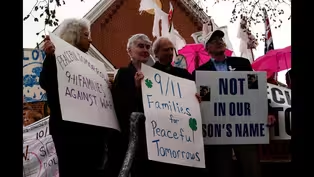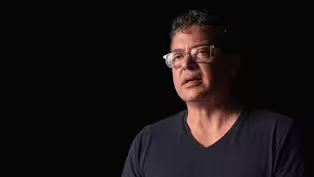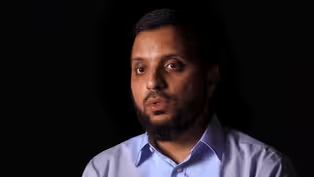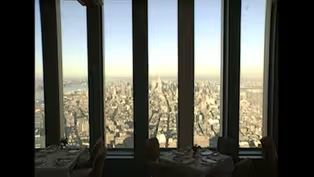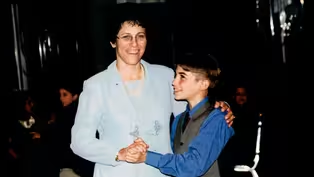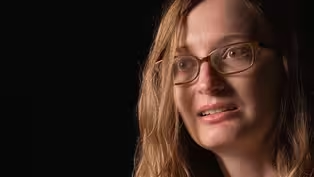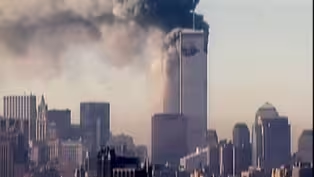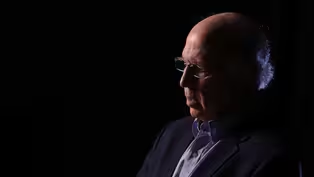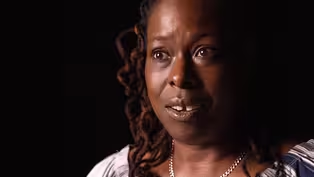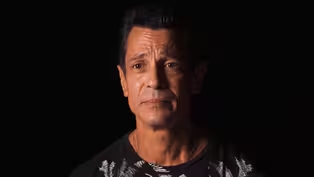
9/11: We Remember
Special | 50m 46sVideo has Closed Captions
In 9/11: We Remember, North Carolinians share personal accounts of that terrible day.
In the new PBS NC special, 9/11: We Remember, North Carolinians share personal accounts of that terrible day. From narrowly escaping the World Trade Center to losing loved ones and colleagues in the collapse, we hear intimate accounts of tragedy, heroism and resilience.
Problems playing video? | Closed Captioning Feedback
Problems playing video? | Closed Captioning Feedback
9/11: We Remember is a local public television program presented by PBS NC

9/11: We Remember
Special | 50m 46sVideo has Closed Captions
In the new PBS NC special, 9/11: We Remember, North Carolinians share personal accounts of that terrible day. From narrowly escaping the World Trade Center to losing loved ones and colleagues in the collapse, we hear intimate accounts of tragedy, heroism and resilience.
Problems playing video? | Closed Captioning Feedback
How to Watch 9/11: We Remember
9/11: We Remember is available to stream on pbs.org and the free PBS App, available on iPhone, Apple TV, Android TV, Android smartphones, Amazon Fire TV, Amazon Fire Tablet, Roku, Samsung Smart TV, and Vizio.
[somber music] - What I remember about 9/11 is that the day started off like any other Tuesday.
I was home that day because my classes were Monday, Wednesday, Friday.
My kids were in school.
- On September 11th, the one thing I remember, it was a beautiful day and I had the day off from CNN that day.
I thought to myself, "Let's go get an oil change."
- I remember that I was working at Radio Shack.
Right after I got out of the service, the United States Coast Guard, my friend called me, "Ricardo, turn on the TV "and look at the news."
Turned the TV on and there was an airplane that somehow, it was crashed in the tower.
- I was a freshman in high school.
I was on my way to fourth period biology and my friend Michelle stopped me in the hallway, and she was like, "Have you heard?"
I said, "Heard what?"
She said, "New York's under attack."
I said, "What?"
- My wife gave me a call on the telephone, it was early morning, and said, "Turn on the television."
And then as I watched, I saw the second plane hit the second tower.
- I just kept watching, and when all of a sudden I saw the second airplane, that's when I'm like, "Eh, this is an attack."
- Got out to the Jiffy Lube.
When I walked into that waiting room, everyone's face was glued to the TV.
I walked out in the parking lot, and then suddenly, there was this low roar thunder and the earth shook.
And I look out into the distance, to the horizon, I see smoke coming up, and I think to myself, "That's the Pentagon."
- I get off of work at about 11 o'clock, hop on the bus to go to New York City.
And I get on the bus, go over there, in through the tunnel, everything is perfect.
Come out at Port Authority and it just seemed different.
People are kind of scurrying.
It didn't seem like a regular city day.
Then, I noticed every ambulance, all of the firehouses are empty.
We're maybe a block away from my school and they said, "Somebody blew up the towers."
And I said, "Somebody blew up the towers?"
And they said, "Yeah, you can't go past here."
- As a senior in high school, I was allowed to leave campus for lunch.
So I left and I went back to my parents' house, and I got there, and I remember walking in the door, and seeing my mom sitting in front of the TV, just quiet and watching.
I remember my mom looking up at me just as I walked in the door and said, "Be ready.
"Our lives are about to change."
[somber music] - "This Thing Rising Between Us," by Sally Atkins.
"The farm and whose children carry flowers and ashes.
"He could be my brother.
"The young suicide bomber, "dark eyed and serious.
"he could be my son.
"The woman veiled, "standing silent in the rubble of Kandahar, "she could be me.
"The older woman in the shelter rocks herself, "repeats her words like a mantra.
""I am alive.
""I am a live, ""I, too, am alive.
""What shall I do now?""
- I think it's important to still speak about the events.
There's a whole generation of people that weren't born when this happened.
I think experiencing the political aftermath of the event, I think, it's important for people to know what the context is, what the true context of an event that might just be a blip in their history book, to hear and feel what it was like to really be there.
My name is John Cerqueira, I worked on the 81st floor of Tower One of the World Trade Center, starting in June of 2001 up until September 11th, 2001.
I grew up in North Carolina, in Durham, from when I was seven.
We moved from New Jersey.
And then in high school, we moved to Cary, North Carolina.
And shortly after, I went to NC State.
Graduated in May and moved up to New York in June for a job that was really just a way to get me to New York.
Going to New York seemed like a rite of passage, it seemed like a next progression of being an adult, being a professional, experiencing a lot of what the world had to offer.
There was this was excitement and a feeling of upward trajectory and momentum.
It was doing all the fun things that the city afforded me, and even enjoying commuting to my office.
The climate leading up to 9/11 was, I would say, marked by optimism.
We were still kind of in that dot-com boom, and there was that energy, and New York was no different.
I remember the night before 9/11 because the New York Giants were playing and they went into overtime.
It was Monday Night Football.
The game took longer than you would have thought.
- [Announcer] 32 Yard line, big play here for Griese who goes deep for Kinison.
- Morning of 9/11 was interesting in that weeks before that, the city was in, what I remember being, an oppressive heat wave.
A lot of people, including myself, commuted to their jobs with whatever they were going to wear that day on a hanger to get to their office and get ready, so I did that.
That morning happened to be the first day of really nice weather.
It was cool, and crisp, and clear.
- [Newscaster] Bright, sunny sky.
65 degrees at seven o'clock in the morning, and sunny and pleasant for the rest of the day.
80 degrees.
- I headed to the city on the subway from my apartment on the Upper East Side, showed up to the office a little late, sat down, had my breakfast, and then headed off to the bathroom to get ready, and put on my shirt and tie and jacket, to get ready for the day.
- [Newscaster] This just in, you're looking at, obviously, a very disturbing live shot there.
That is the World Trade Center, and we have unconfirmed reports this morning that a plane has crashed into one of the towers of the World Trade Center.
- So when the first plane hit, a few coworkers and I were in the bathroom, getting ready for the day.
When it hit, it was jarring.
It sounded and felt like a bomb.
Tiles fly off the walls and feeling the building swaying.
The immediate direction was that we should get in a doorway, but as we got to the doorway of the bathroom, we saw some fire in the hallway, and the walls were starting to collapse in.
From the office that we were brought to from the floor fire marshal, we were told to stay there for a while.
It seemed safe enough, and that's where we were allowed to use the office phones and try to call out.
I was able to call my father and the conversation is very brief.
So I called him and said, "Hey, I'm in the building.
"I'm on the way out."
And he didn't give me any details, I think just not to alarm me.
He said, "Get off the phone!
"Get out right now!"
We looked out the window and saw debris, and what looked like articles of clothing.
And the direction remained to stay where we were.
That changed pretty abruptly because of the other plane hitting the other building.
- [Newscaster] It does not appear that there's any kind of an effort up there yet.
Now remember... Oh my God!
- [Newscaster] Oh there's another one, another plane just hit!
Oh my God, another plane has just hit.
- From the 81st floor to the 67th floor, I remember moving pretty quickly.
There weren't a lot of people in the office where we were, on the 81st floor.
My boss and I ran into each other on the 67th floor.
I asked him what was going on and what the condition of our office was.
He said it was completely destroyed and everybody in our office was already down the stairs.
We began to head down and that's where we heard people in the hallway, in the floor above us, on 68.
So we decided to go back up and help other people figure out that this stairwell was open.
We happened upon an office for the Port Authority, trying to get people to leave.
We were able to get into the office and realized why they were all standing there, and it was because one of their coworkers was a wheelchair user and had a very heavy, motorized wheelchair, and they weren't quite sure what to do.
She actually directed us to an emergency wheelchair that was in the office because she was in that office during the original bombing in 1993.
So they had already installed an emergency wheelchair that was a lot lighter.
Then my boss and I left the office with her, and got back to the stairwell on the 68th floor.
We were moving at a pretty slow pace, maybe a flight or two at a time, and then we stopped and rested.
We knew that there was a fire that we were trying to outrun, but just we couldn't move any faster.
We started seeing firefighters around the 40th, 45th floor.
They were aware of what was going on, but to not alarm anybody, I suppose, weren't really sharing a lot of the details.
When we saw the firefighters, we could tell how exhausted they were, and just look on their face was that something was serious.
There was a change in tone when we saw that.
I remember hearing some reports of something will collapse, but I just thought it was maybe a floor, a floor or two, or a wall would fall in, or just something like you're on a construction site and you should be careful.
It never registered that the building entirely would collapse.
[somber music] [sirens blaring] At the time where the second tower had collapsed, I remember commotion in our stairwell, and the doors, the steel doors flapping back and forth like they were made of paper, and debris coming in our stairwell, and then the lights went out.
- [Newscaster] Yeah, it looks like a big chunk of it has just peeled away.
- [Newscaster] One can only hope that the area has been evacuated.
- [Newscaster] The whole side has collapsed in.
- [Newscaster] The whole building has collapsed.
- [Newscaster] The whole building has collapsed?
- [Newscaster] The building has collapsed.
- [Newscaster] That's the So uthern Tower you're talking... - When we got into the lobby, we saw that it was destroyed.
The doors were not working, so we just exited through a broken window.
We put Tina in an ambulance that was waiting and they sped away, and then we just surveyed the scene, just saw what was going on.
And what we saw was ash, thick ash on the ground.
Thick and very light colored ash, it almost looked like snow.
And we looked back at our building, and next to the building was a Marriott hotel.
We saw what looked like a piece of the facade, kind of a waffle looking piece of the facade, kind of impaling the top of the hotel.
We kept hearing kinda this crashing sound, and as we looked up to the top of our building, we started seeing some debris floating down.
Some that was more dense, some that was lighter and floating, and one piece of what I thought was debris caught my eye, and it ended up being one of the many people who were jumping off the building.
I followed the view of what looked like a man as he got closer to the ground, kind of fell behind a building, so I did not see him make impact.
Had a feeling of recognizing that a sound that I had heard, that sounded violent enough, was actually people ending their lives.
It was a punch in the gut.
That was the moment where the severity of the situation just all came rushing in.
- [Newscaster] Right now, the city and federal buildings in Newark are still open though.
Again, heavily fortified.
That's the latest.
Now, we're going to continue to monitor these developments, particularly with the schools closing.
- [Newscaster] The other tower, as you can see, seems to be collapsing David, as we watch.
- [Newscaster] Unbelievable.
- All of a sudden we started hearing a waterfall sound.
It's more like rushing, almost liquid.
My boss and I realized that our building was peeling away, felt like we were right underneath it.
We were maybe across the street, maybe a block away.
We ran as far and as fast as we could.
Running from the tower was an experience of running from something you really can't outrun.
I jumped behind a van and my boss jumped underneath a firetruck and waited for the debris to pass over.
One point, it felt like I couldn't breathe at all.
That was the time where I felt like that was it.
When you're facing that experience, there's a lot of reconciling with mortality, and prayer, and sadness for loved ones who would have to mourn.
And then, really, curiosity of what was going to be next.
The debris that was so thick that it was dark, it looked like it was dark as night, started to dissipate and then started getting gray, and then a little lighter.
And so, I got up and trying to yell for my boss.
So I finally found him, and we grabbed onto each other, and started heading uptown.
The person I was eight o'clock in the morning on September 11th versus two o'clock in the afternoon I think could be characterized by where my priorities were.
My focus was on career and fun, and I don't think there was any other event that adjusted my priorities as quickly.
I hope that people remember the day as an event that was not characterized or remembered by the fear we all felt, or by the hate or the evil, rather that the tone of love and compassion, unity, for the first responders.
Their presence there that day, their memory of what they did.
Knowing, for most of them, that they were entering a building and were never going to come out, that's not just heroic, that's a demonstration of almost a divinity.
It's awe-inspiring and it represents the best of us.
Love and relationships are the currency we should be operating in versus short-term, or even long-term, professional, worldly goals.
There's something bigger than we can all see and touch, and I've experienced that, from the grace from being able to continue my life on earth, but also revealing how important relationships, and love, and just value of humanity is.
- I go to the World Trade Center train stop, that train used to be in the basement of the World Trade Center.
And when we got to that stop and I saw sunlight, I broke all the way down and started crying because I'm like, "this is the World Trade Center "and you see sunlight?
"This is a basement, underground railroad stop."
- As a kid, my parents used to take us on vacation to New York City.
We went up there to both towers.
I remember being on top and then in front of them, they was very impressive.
See them fall was horrible.
- I remember American flags just everywhere after that.
People were had them on their cars, it was everywhere and it was a very surreal time.
It was definitely on everyone's minds, and we were talking about it the rest of the year.
When you bring it up, it's like it was yesterday.
So it's definitely still raw.
- I'm Jeffrey Kaplan, and I'm Assistant Professor of Philosophy at the University of North Carolina at Greensboro.
- I grew up in Paramus, New Jersey, which is a suburb of New York, and it is suburban New Jersey.
And so, it was a very nice place to grow up.
Both of my parents, on and off, worked either in Manhattan or various other businesses in New York city or Bergen County.
My father had to go into Manhattan two days a week to go to showrooms to look at women's dresses.
He was dress buyer for clothing companies.
My mother, originally, worked in Jersey City in an office building.
She worked for the Port Authority of New York and New Jersey.
And sometime before September 11th, she transferred offices within the same organization, and then she was working in the World Trade Center.
On the morning of September 11th, I remember I was going into gym class in the morning, in this new, big public high school that I had started attending, and I didn't know anyone.
And I was going into the locker rooms before gym class, and someone said that a helicopter had crashed into the Twin Towers.
Nothing really registered with me as that being a significant event.
And my high school biology teacher was crying, was trying to get in contact with her father, and she hadn't been able to get in contact with him.
And then it occurred to me that I should be worried about at least one of my parents, and I was mostly worried about my father, and I was thinking, "Oh, he works in Manhattan "a few days a week.
"Is this one of the days a week "when he might be in Manhattan?"
And I don't remember much else from that day until I got home from school, and everyone was at the house.
There were a million cars parked outside, and all my uncles, and aunts, and relatives, and grandparents were at the house, and my father was there, but my mother wasn't.
She worked in the North Tower on the 64th floor, and after, I believe, the first plane hit, she called my grandmother, her mother, in New Jersey, to tell her everything was fine.
Everyone was then obviously very worried when the towers collapsed, not knowing whether she had gotten out of the building in between the time that she made that phone call and when they collapsed.
And so there was a period of...
When we didn't know what had happened.
It was just a slow dawning of the reality, just over the course of the next several days, or even weeks, that the longer we went without getting a phone call, the less likely it was that she had gotten out of the building before it collapsed.
I remember lying in my bed at home, being awake at night, and just running through every significant philosophical question about death.
All of a sudden, questions like, "Do human beings have a soul?"
And "Is my mother... "Is her consciousness somewhere, continuing to exist?"
I'm now a philosophy professor, and so I'm still thinking about those questions as a very straightforward, direct result of thinking about them on September 11th, or September 12th, or whenever it was when I couldn't fall asleep.
I don't think about what September 11th means.
I think about my mother, and what her life and death meant to me, and my siblings, and my father, grandparents, and that sort of thing.
And she was an extremely, extremely loving mother.
Very good at mathematics, handled all the finances for the household, but also very, very willing to explain things in detail.
And so, as a child, if you asked her a question, she didn't give brief answers.
Her answers were thorough.
She was very intellectual and thoughtful.
And as a kid, you'd find books in the basement, parenting books, personal finance books, she was well-read, but more than that, she was just very thoughtful, and she wanted us to be very thoughtful.
And I don't think about it enough, or I don't appreciate enough, that way that I am to my own kids.
My daughter, Debra Sadie Kaplan, who we call DD, is named Debra after my mother, even though there are surely no other Debra's born in 2018.
When she gets older, when you're older than three, you can hear stories and be told about your relatives, and so, she will know all about my mother, her bubby, her grandmother, and she'll always have that connection.
- Katie.
"After the first plane, Katie phoned her brother.
"She was safe in another building.
"They were evacuating.
"DJ thought she had said "the other building," "the South Tower crashed into "by United flight 175 at 9:03, "moments after the line went dead.
"That's all Katie's mother, "my sister Marie could tell me when I called.
"Somewhere beyond the screen, inside that television, "from which we all that day received like communion "the new covenant for all time, "was my niece in her brown suit, "a new haircut, "her purse outfitted for her seventh day in Manhattan, "her fourth day at the World Financial Center, "then barefoot, blocks and blocks, "to her apartment on 89th street, "where she dialed her parents "and announced with a sacrificial modesty of saints "that she had made it home."
- Windows on the World was located on the 107th floor of One World Trade Center.
At our busiest times, we employed over 500 people.
We had over 60 different nationalities represented, and the people who worked there and 86 people were killed on September 11th, who were employed by Windows on the World.
I would describe Windows on the World as this really beautiful, beautiful family.
What I believe heaven to be like, yeah.
People across all different religions, races, socioeconomic backgrounds, together in harmony.
- Windows on the World was almost surreal.
Just the whole experience working there.
You're at the bottom of the World Trade Center, you look up and it's kind of unbelievable.
You've actually walked out the dining room and you look out on the entire world, it seems like.
And every day now, you're kinda struck by something, something incredible happens.
Looking at a plane fly below you, the entire city covered with clouds, and just spire of the Empire State Building sticking up.
- Yeah, here I am, beverage director for the largest grossing restaurant in North America, and I am loving every aspect of it, and it truly felt like I had something that was probably the biggest gift I'd ever be given; to love what you're doing, to love where you're doing it, to love who you're doing it with.
My friends and I were talking about if we could do time travel, and I would go back to 2000, 2001, that was just...
It was an amazing, amazing time.
I loved everything about New York.
New York City in the summertime is honestly my favorite.
I love how hot it is.
I love the smell on the subway.
I love eating outside.
I grew up in Tarboro.
I actually give Tarboro all the credit for being able to make it in New York because I was working with a lot of different people from a lot of different backgrounds, and I give Tarboro the credit for being able to exist in that world.
My husband will say that wine and food are the first things that I loved and did without my family's permission.
They are truly my own.
So I got the job offer as an assistant cellar master in the beverage department, and then I left.
I moved to California for six months, and I think it was probably a very smart career move because I think when I left, the beverage department realized that I was missed.
So they called me up five months later and said, "We'd like to offer you the position "of the beverage manager," which was a much, much bigger, bigger job.
- Eventually got a job as a sommelier when I was 22 out in Sedona, Arizona.
And I got lucky and got an interview at Windows on the World at the top of the World Trade Center.
The three people that hired me all left for different jobs, so that was kind of the situation.
They brought her back to be my boss.
And so, in walks this little cute, Southern girl, and I'm like, "There's no way this is my boss," but she was.
But we had a good young crew, we had a lot of fun.
Eventually we started dating secretly and that was kind of our life at the time.
It was pretty, pretty cool to be that age, in those positions, in Manhattan.
- Everything was great, I mean... And we were really getting our stride as a beverage department.
I remember it well.
It was labor day weekend, was the weekend before, I did this deep clean of the office, unorganized the whole thing, and I uncovered this six liter of Montcourt La Cordon Rouge.
There are two assistant cellar masters, both of them worked that day, the morning shift and the evening shift, and I said, "You guys, "when I come back from this wedding, "this is what we're going to drink."
Then Tuesday, I came back to work, and I was gonna leave on Wednesday, and the woman in the uniforms had tailored my bridesmaid stress.
I mean, if that doesn't tell you what family is.
I'd taken...
I mean, I asked first, and said, "I'm going to be a bridesmaid "in my sister's wedding."
On September 11th, I lost my entire innocence and my rose-colored glasses of the world.
I woke up the morning of September 11th in my twin bed, with it pitch dark, and my mom was over me and she was crying.
And she couldn't talk.
She said, "I need you to come and watch the TV."
And so, I got out of bed, the plane had hit One World Trade Center and, so naive, I thought, "Oh my gosh, I just cleaned up that office.
"It's going to take me forever "to get it all cleaned up again."
And literally right when I sat down, the second plane was coming into Two World Trade Center.
I used the landline to keep calling my office so I could talk to Steve or Jeff, the two people that were working for me while I wasn't there, And it just would go straight to busy signal.
Then, I'm trying to get in touch with Stephen, And his phone was just ringing, ringing, until answering machine.
And that's when One World Trade Center started imploding, and it was just... From there on, it was so blurry.
- [Commentator] Collins, touchdown.
Caught by Marcellus-- - I'm a diehard Giants fan.
We were out watching them play a Monday Night Football game against Denver, I think.
And I think it went into overtime, or it was a late game, and I lived in Jersey City at the time so I had to take...
Wherever I was, I had to get to the bottom of the World Trade Center to take the path train underneath the Hudson.
So I'm sitting in the bottom of the World Trade Center at 1:30, Tuesday morning, and then finally catch the 1:30 train, get home, go straight to bed.
I think I'd set something my alarm for 10 o'clock.
I was due in at work at 11.
So I had the answering machine, and the light's blinking, and I looked down and I see 27 messages, I'm like, "That can't be right."
And so, I hit play and I start hearing these like odd, "Where are you?
"Are you at work?"
This and that.
I mean, random people calling me.
Then I started getting a feeling that something had happened, and stuck my head out the window and looked left, and all I saw was smoke.
I immediately turned the television on and then everything came into focus.
The ones that probably were the closest to us were the two guys that were in the beverage department, that were like our employees.
We were mentors to them, and the one guy we had just promoted, and I don't think he had ever really had a job that he was proud of.
And we went to his memorial and one of his friends had said that.
He was like, "He'd never bragged about a job before "until this one."
His name was Steve Adams.
Jeff was our other assistant cellar master and his girlfriend at the time, to this day, is one of our best friends.
Every week on Tuesday, we did a weekly inventory, so Inez was always there on Tuesdays.
Being that she was in North Carolina and she extended her stay a little bit, this guy, Steve, who we loved, was there in her place.
So there's a tremendous amount of guilt you feel, and I think that's just inevitable.
How do you not feel guilty if you have a soul?
- I went into work at eight in the morning, Monday through Friday.
Every day you wake up, and you get up, and you get out of bed, and you put one foot in front of the other, no matter how painful it is.
And I think there were days where all I did grieve the loss of people.
And then, there were days where... Much lighter, where it'd be less heavy.
I don't think time heals all wounds, but I certainly believe that time is the only thing that can make it less heavy.
- Going back to New York City after 9/11 was difficult.
At one point, I guess it was the spring, she's like, "I gotta get out of here."
And I was like, "Yeah, I'm right there with you."
We made plans to move back to North Carolina for a little bit, and then a friend of ours has an estate in Burgundy, and had asked us to come out and work harvest.
And while we were there, Inez's father facilitated the purchase of "On The Square," and that's what brought us back to Tarboro.
- Community was really, really key in this whole healing.
I don't think our healing would have been as whole had it not been for this community.
- On The Square.
- And then we opened up The Tap Room in June of 2016.
That's our canning line.
- Every year, when it comes up, brings back a lot of memories.
Even though they're sad, it's still good to remember.
It's good to remember people, friendship memories.
I can't change the fact that it's part of my story.
I can't change it and I'm not going to run away from it.
- We, Stephen and I, have two children; Cynthia, who is 16, and Stephen, who is 13.
Cynthia was born on September 12th, 2004, and I always tell her, she was what helped make my heart whole again.
But of anything that I've ever done, those two are my proudest.
- I would say, was it revenge from all the times and all the mistakes that America, or the United States, had done in other countries?
But as a country, after 250 years, we didn't start perfect.
And I think that day, it brought us a lesson that we're still vulnerable and that we still need to stick together.
- But I think Americans, for a long time, have forgotten what it's like to be vulnerable.
I think once you realize you're vulnerable, suddenly, you start to listen more to others.
And I think, there was a time during around 9/11, that we were coming together as a country.
We were also listening to the world, the world was listening to us.
And I think we, for a very short period of time, we had that integrated relationship that, today, is so important.
- And I never really looked at the US and the world the same way.
I didn't really watch the news because I was a 14 year old.
Social media was not a thing.
People weren't getting their news from Facebook.
So it just kind of opened up the world in a really horrific way.
You started paying attention.
After that, you started watching the news with your parents every night.
- Nobody knows about Islam or Muslims.
And so, the only information coming out from the news networks at the time was really terrible and negative.
And so, my first call to action, to myself at least, was, "We need to get messaging out.
"We need to let the world know what Islam really is, "who Muslims really are, "and that this terrible attack is "not at all representative "of the billion plus Muslims around the world."
- [speaking foreign language] Lifting veils, September 11th, 2001.
"It is a blood-stained horizon, whispering, "[speaking foreign language] "Prelude to a balmy evening "that envelops our embrace.
"We stand reaching across sands, waters, "air full of blood.
"In the flash of a distant storm, "I see you standing on another shore.
"Torn hijab, "billowing towards an unnamed wind.
"We both wear veils, "bloodstained, tear-stained, "enshrouding separate truths.
"Into your eyes, I swam, "searching for veils to lift, "to wrap, to pierce, dance with.
"Veils that elude such mornings.
"Veils that stain such lips.
"Veils tearing like music.
"It is the covering of spirits, "not the body.
"My hijab, your hijab, "connecting into weaving, "crawling, snaking, binding, "into a sky that will not bend."
- Why is it important to find peaceful solutions to problems started by war?
Because I think, ultimately, finding peaceful solutions is the only solution.
I'm David Potorti, I'm the co-founder of "September 11th Families "For Peaceful Tomorrows," and the co-editor of a new book of poetry, called "Crossing The Rift: "North Carolina Poets on 9/11 and its Aftermath."
On September 11, my brother, Jim, he was my older of two brothers that I have, died at the World Trade Center on September 11th.
He worked in the North Tower, and the plane that hit the North Tower pretty much went right into his office.
So he was killed that day.
My mom had called me and told me what was going on.
And we watched it on TV, like everybody else.
We watched the replays of the planes hitting the building and we watched the buildings fall down, and we didn't really know for a couple of days that my brother was gone.
And it was pretty clear on Friday that if he was in his office, there was no way that he survived.
And so, that's when I told my parents that this is what happened, and I do have a very vivid memory of my mom and dad hugging each other.
And my mom just saying my brother's name and saying, "I don't want anybody else to have "to feel the pain that I'm feeling right now."
My father is a Fourth Division Marine in World War II.
My father lost 75% of his company in combat, he was in the South Pacific.
And his response was not anger, his response was very circumspect and very measured because I think he had a really good idea of what war actually is, if we were going to go to war over this, because he had seen.
Most of the people that he served with were killed quite dramatically and tragically.
I remember that, and I sort of took that as guidance.
I remember CNN is on, and they've got all these graphics about America's new war.
And it was kind of amazing how quickly we had sort of pivoted from this feeling of sympathy and collegiality with other people who had suffered into this militaristic response, and I was kind of taken by that because I think the response, really, from just about all over the world when this happened, was a response of compassion and empathy.
I think it's important to let people know that they have choices about how they feel, that when a country decides it's going to go to war, that there can still be some dissent and some discussion about how that happens or what the goals are.
- Every nation in every region now has a decision to make.
Either you're with us or you are with the terrorists.
- So I think it's important for people to have that sort of a realization, that it's not "You're with us "or you're with the terrorists."
It's not black and white like that.
There's always room for people to talk to each other.
And I remember also, at the time, thinking, "Okay, this is September, "we're going to be into Thanksgiving, "and we're going to be saying all the wonderful platitudes "that we say around those times "at the same time that we are bombing Afghanistan."
Maybe that's necessary, maybe we need to get the guys that did this so that it doesn't happen again, but ultimately, we're going to be killing a lot of other innocent people.
I'm a writer, so I started writing opinion pieces in newspapers about, "We've got to pay attention "to the outcomes of war "and what our response to this is."
And then there were other people, who had lost family members as well, who also wrote things, wrote their own opinion pieces.
And there was a group that brought all those together, it was a woman named Kathy Kelly, who's a peace activist.
And she collected all of those voices because she had read them in the paper.
And so, that's how I met the family members who, ultimately, we created "September 11th Families "for Peaceful Tomorrows."
I think with a group like Peaceful Tomorrows, I'm advocating for my people.
And by that, I mean, civilians.
And what we've learned is that most of the deaths in war in the 20th century were civilian deaths.
And so, I think it's important to have solidarity with those people, whoever they are around the world.
- Family members of the victims of 9/11 are making a statement about terrorism etched in stone.
They will drag a 1,400 pound monument from Boston to New York City.
- And so, we wanted to just explore those possibilities and just say, "The answer is not always dropping bombs.
"There has to be something besides that."
We also wanted to keep an eye on threats to civil liberties that occur when you go to war.
We suspected and came to learn that there would be lots of effects on civil liberties, human rights issues, surveillance, Islamophobia, racial profiling.
We wanted to keep an eye on all of those things as an outcome of the war.
We also wanted transparency from our government.
We wanted to understand what happened on 9/11, why it happened, who was involved.
One of the things I learned in working with my group and what people taught me is that there's no hierarchy of suffering, that my suffering is not better than your suffering, that your family members who died are not more important than my family members who died.
And we've commemorated the bombing of Hiroshima.
We killed 140,000 people when we bombed Hiroshima.
We killed 70,000 people when we bombed Nagasaki.
Those people were just like me, those were civilian casualties.
People stay in anger because they don't want to deal with grief, so I think we have to be able to deal with grief.
I think Americans, uniquely, do not now know how to deal with grief.
I think the answer to everything is love, is love and human solidarity.
That I don't have to agree with you, I don't have to like you, but I do have to love you, sort of the way that Martin Luther King Jr talked about.
I have to love you, I have to recognize that you and I have a shared destiny in this world.
And I realize that my kids are never going to be safe unless your kids, 8,000 miles away, are safe, that we're connected.
And so, maybe we can't stop terrorism and war, but we can do what we can, starting with ourselves, to take care of each other.
And I think that that spreads out and that we wind up taking care of the whole world.
- It's one of those events [murmurs], it changes your world.
You don't forget that.
On an individual basis, and also just as a country, nothing was ever the same.
You don't know anyone personally down here in North Carolina, but you're still connected, those are still your countrymen, so it still hurts.
- The bravery, the loss of life, the bounce back.
It is a symbol of how strong we are.
It's one of the traumatic events that bridges together ages, races, genders.
No one was exempt from September 11th.
September 11th did not discriminate who it impacted, and that's one of the reasons why we should never forget, because it was a tragedy that brought a lot of people closer that necessarily wouldn't have been in the same village.
- We need to remember so that we can commemorate, never deny that awful things happen, and by commemorating, we insist that those terrible things will never happen again.
[somber music] ♪
David Potorti: Peaceful Tomorrows
Video has Closed Captions
Clip: Special | 7m 50s | David Potorti is the co-founder of September Eleventh Families for Peaceful Tomorrows. (7m 50s)
Video has Closed Captions
Clip: Special | 1m 30s | Former CNN Producer Evan Howell describes the plane hitting the Pentagon on 9/11. (1m 30s)
Video has Closed Captions
Clip: Special | 1m | Muslim-American Imran Aukhil remembers the life-changing events of 9/11. (1m)
Inez & Stephen Ribustello: Life After Windows
Video has Closed Captions
Clip: Special | 11m 58s | Inez and Stephen Ribustello remember the colleagues they lost 20 years ago on 9/11. (11m 58s)
Video has Closed Captions
Clip: Special | 6m 31s | Jeffrey Kaplan was only 14-years old when he lost his mother on September 11th. (6m 31s)
Video has Closed Captions
Clip: Special | 1m | Jen Boehm describes her reaction as a high school freshman on 9/11. (1m)
John Cerqueira: Surviving the Towers
Video has Closed Captions
Clip: Special | 14m 22s | John Cerqueira narrowly escaped the World Trade Center September 11th attack. (14m 22s)
Video has Closed Captions
Clip: Special | 1m 15s | Former NC Poet Laureate Jospeph Bathanti tells his personal 9/11 story and shares a poem. (1m 15s)
Video has Closed Captions
Clip: Special | 1m | Junique Greene describes her horror of the attacks as an NYC college student on 9/11. (1m)
Video has Closed Captions
Clip: Special | 50s | Ricardo Diquez remembers how he felt during the attacks on 9/11. (50s)
Providing Support for PBS.org
Learn Moreabout PBS online sponsorshipSupport for PBS provided by:
9/11: We Remember is a local public television program presented by PBS NC
